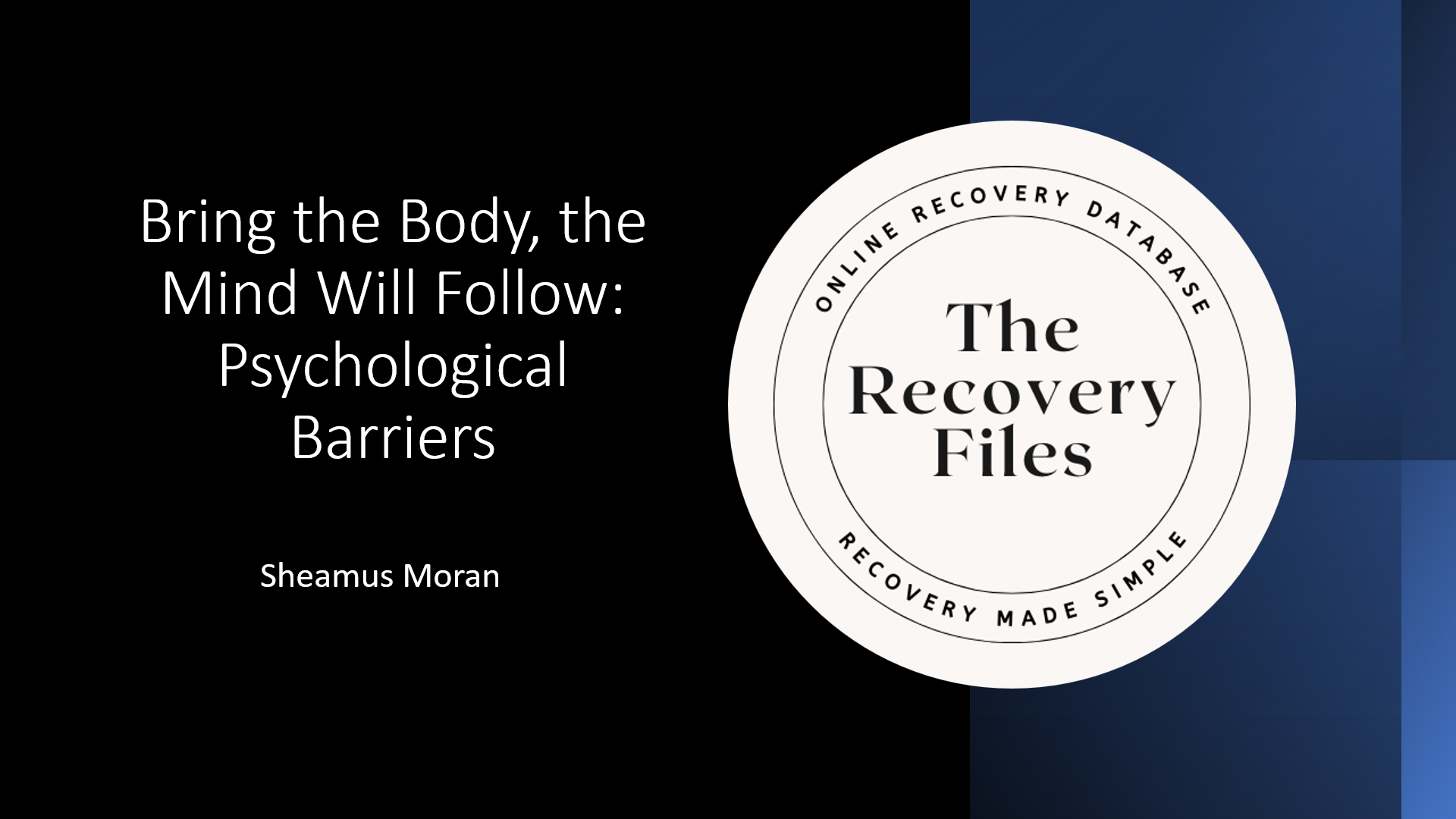
Bring the Body, the Mind Will Follow: A Recovery Engagement Workbook
"Bring the Body, the Mind Will Follow" - Recovery Engagement Workbook
This workbook addresses a fundamental recovery principle: meaningful healing begins with the simple act of showing up consistently, even when motivation wavers. It explores five dimensions that affect recovery engagement:
Physical Resistance: The tangible ways we avoid recovery participation - like last-minute cancellations, chronic lateness, or prioritizing less important activities over recovery.
Psychological Barriers: Internal obstacles like fear of judgment, feeling like an impostor, or believing your case is "special" that prevent full engagement.
Fear of Presence: Specific anxieties about being physically, emotionally, and socially present - like worrying about seeing known people, fearing emotional overwhelm, or concern about forming new relationships.
Inconsistent Attendance Patterns: Ways of maintaining some recovery contact while avoiding deeper benefits - such as crisis-driven attendance, "recovery tourism," or minimum participation.
Mental Absence: Being physically present while psychologically disconnected - manifesting as distraction, planning other activities, or critical observation rather than participation.
Each section includes comprehensive self-assessments with scoring guides, detailed explanations of different manifestations, self-reflection questions, personalized mapping exercises, action planning tools, and systematic approaches to overcome these challenges.
The workbook emphasizes that recovery isn't about perfect engagement, but developing awareness of resistance patterns, implementing effective strategies, and recognizing that showing up consistently - even during periods of doubt or discomfort - creates the foundation for lasting recovery.

Bring the Body, the Mind Will Follow: A Recovery Engagement Workbook
Workbook Overview
This comprehensive workbook addresses one of the most challenging aspects of early recovery from substance use disorder—the gap between knowing what to do and actually doing it. Based on the principle that "meaningful recovery begins with simply showing up," this workbook provides practical tools to help individuals overcome the various forms of resistance that prevent full engagement in the recovery process.
What You'll Learn
The workbook explores five key dimensions of recovery engagement:
Physical Resistance - Identify and overcome the tangible, often unconscious ways you avoid recovery participation, such as last-minute cancellations, chronic lateness, and unexplained physical symptoms.
Psychological Barriers - Recognize and address thoughts, beliefs, and emotional reactions that prevent full engagement, including fears of judgment, beliefs about being "different," and perfectionism.
Fear of Presence - Develop strategies to manage specific anxieties about being physically, emotionally, and socially present in recovery settings.
Inconsistent Attendance Patterns - Establish reliable, committed participation instead of crisis-driven or minimal engagement that prevents deeper healing.
Mental Absence During Attendance - Learn to be fully psychologically present rather than physically attending while mentally disconnected.
Module Structure
Each module includes:
Detailed Self-Assessment - Identify your specific patterns of resistance through comprehensive questionnaires
Scoring and Interpretation - Understand your vulnerability levels and resilience ratios
Dimensional Analysis - Explore the unique manifestations of each type of resistance
Self-Reflection Questions - Deepen your understanding through guided inquiry
Personalized Mapping Exercises - Create individualized maps of your resistance patterns
Action Planning Tools - Develop targeted strategies with clear timelines and accountability measures
Comprehensive System Development - Build robust systems to maintain engagement over time
Why This Approach Works
The workbook emphasizes that recovery isn't about perfect engagement but about developing:
Awareness of specific resistance patterns
Effective tools to respond to resistance
A perspective that views each instance of "showing up" as strengthening recovery
Regular attendance at meetings, therapy sessions, and support groups provides the structure necessary for the brain to establish new patterns while disrupting harmful cycles. By maintaining physical and mental presence—even during periods of doubt, discomfort, or resistance—you create the foundation upon which lasting recovery is built.
Begin Your Journey
Start with the comprehensive self-assessment to identify your primary engagement challenges, then work through each module systematically to develop a personalized approach to recovery participation. Through consistent practice, you'll transform resistance into resilience, demonstrating the profound truth that when we consistently bring our bodies, our minds will eventually follow.

Bring the Body, the Mind Will Follow: A Recovery Engagement Workbook
Program Overview
This comprehensive self-assessment workbook is designed for individuals in early recovery from substance use disorder who struggle with consistent participation in recovery activities. Based on the fundamental principle that meaningful recovery begins with simply showing up—even when motivation is low and fears are high—this workbook provides practical tools to help bridge the gap between intellectual understanding and committed engagement.
Why Physical Presence Matters
Recovery requires more than just knowledge—it demands consistent participation. When emotions are raw and thinking is clouded in early recovery, the simple act of physically attending meetings, therapy sessions, and support groups creates the foundation upon which deeper healing gradually builds. Regular attendance provides the structure necessary for the brain to establish new patterns while disrupting harmful cycles.
Physical presence enables:
Accountability through community connection
Exposure to the wisdom and experience of others
Opportunities to build relationships that counter isolation
Gradual development of new habits and neural pathways
Self-Assessment Structure
The workbook begins with a comprehensive 70-question self-assessment divided into two parts:
Part 1: Recognizing Attendance Barriers (35 questions) helps you identify patterns of resistance across seven dimensions:
Physical Resistance (finding excuses, chronic lateness)
Psychological Barriers (fears of judgment, feeling like an impostor)
Environmental Challenges (transportation issues, scheduling conflicts)
Independent Recovery Mindset (discomfort with vulnerability, resistance to feedback)
Fear of Presence (worry about emotional overwhelm, anxiety about new relationships)
Inconsistent Attendance Patterns (crisis-driven attendance, recovery "tourism")
Mental Absence During Attendance (distraction, planning other activities)
Part 2: Building Physical Presence Practices (35 questions) evaluates your current strengths in:
Commitment Development (non-negotiable scheduling, honoring commitments)
Fear Management (acknowledging fears without letting them prevent attendance)
Active Engagement Practices (participating rather than observing)
Building Recovery Connections (forming meaningful relationships)
Consistency Cultivation (establishing routines, planning for obstacles)
Moving Beyond Physical Presence (integrating insights into daily life)
Accountability Development (informing others of plans, taking responsibility)
Scoring and Interpretation
The assessment provides detailed scoring guidelines with interpretations for both your Attendance Barrier Score and Physical Presence Practice Score. By calculating your Presence Ratio, you'll gain insight into whether your current practices are sufficient to overcome your barriers.
Personalized Mapping and Action Planning
The workbook guides you through creating a personalized map of your specific attendance patterns and developing targeted action plans to address your most significant barriers. Each action plan includes:
Clear definition of the specific barrier
Measurable goals for addressing it
Small, manageable action steps
Accountability measures
Implementation timeline
Anticipation of potential challenges
Building a Comprehensive System
Beyond addressing individual barriers, the workbook helps you develop a robust system for maintaining consistent engagement through practices such as:
Weekly attendance inventory
Pre-meeting intention setting
Recovery calendar system
Barrier response protocols
Environment assessment
Graduated engagement planning
Support partnerships
Reflection journaling
Transformational Approach
This workbook emphasizes that recovery isn't about perfect attendance or immediate mental alignment with recovery principles. Instead, it focuses on:
Developing awareness of your specific resistance patterns
Building effective tools to respond to resistance
Recognizing that each instance of "showing up" strengthens your recovery foundation
By maintaining physical and mental presence in recovery spaces—even during periods of doubt, discomfort, or resistance—you create the conditions necessary for psychological healing, emotional growth, and lasting recovery. The workbook can be revisited periodically to track your progress and refine your approach as your recovery evolves.
Between the impulse to avoid and the choice to attend lies a space of possibility that grows larger with each day of recovery practice. In that space lies the freedom to choose physical presence even before the mind is fully convinced, trusting that consistent attendance creates the very conditions necessary for deeper healing.

Physical Resistance in Recovery: Understanding and Overcoming Avoidance Patterns
Module Overview
This self-assessment module explores "physical resistance" – the tangible, often unconscious ways we avoid recovery participation despite intellectually understanding its importance. By identifying these subtle resistance patterns and developing effective responses, you can establish the consistent physical presence that forms the foundation for deeper healing.
Why Physical Resistance Matters
Even when we recognize the importance of recovery activities, our bodies can develop their own forms of resistance that prevent full participation. This disconnect between intention and action creates significant vulnerability in recovery, delaying progress and healing. Physical resistance operates below conscious awareness, making it particularly challenging to address without focused attention and specific strategies.
The Assessment Structure
The comprehensive 70-question assessment is divided into two parts:
Part 1: Recognizing Physical Resistance Patterns (35 questions) helps you identify seven dimensions of resistance:
Avoidance Behaviors: Creating last-minute excuses, scheduling conflicts, leaving meetings early
Time Management Resistance: Losing track of time, overcommitting, poor boundary setting
Physical Manifestations: Unexplained symptoms, unusual fatigue, anxiety before meetings
Environmental Setup: Failing to prepare for attendance, maintaining triggering environments
Prioritization Patterns: Treating recovery as optional, allowing others' needs to take precedence
Justification Development: Creating plausible rationales for missing meetings, using "just this once" thinking
Physical Engagement Resistance: Remaining passive, using closed body language, avoiding eye contact
Part 2: Developing Physical Presence Practices (35 questions) evaluates your current strengths in:
Proactive Scheduling: Treating recovery as immovable appointments, planning ahead
Physical Symptom Management: Distinguishing between genuine illness and resistance symptoms
Environment Optimization: Creating supportive cues, eliminating obstacles
Behavioral Commitment Strategies: Using "if-then" planning, establishing accountability
Reframing Physical Resistance: Viewing resistance as information rather than failure
Gradual Exposure Practices: Breaking down intimidating activities, celebrating small victories
Momentum Building: Leveraging consistency, reconnecting after absences
Personalized Understanding and Action Planning
After scoring your assessment, you'll create a personalized resistance map that identifies your specific patterns and develop targeted action plans for your most significant challenges. Each action plan includes clear definitions, measurable goals, concrete action steps, accountability measures, implementation timelines, and strategies for overcoming potential obstacles.
Building a Comprehensive Response System
The module guides you in developing a complete resistance management system through practices such as:
Regular resistance check-ins
Predictive planning for high-risk scenarios
Environmental audits to support attendance
Specific protocols for common resistance patterns
Visual tracking systems to maintain momentum
Support partnerships focused on overcoming resistance
Meditation practices centered on physical presence
Graduated exposure approaches to challenging situations
Transforming Your Relationship with Resistance
This assessment emphasizes that resistance is a natural aspect of recovery rather than a personal failure. By developing awareness, effective tools, and a growth-oriented perspective, you can transform your relationship with resistance itself. What once might have led to disengagement can become an opportunity to deepen commitment and strengthen recovery.
Between the impulse to resist and your response lies a growing space of choice. In that space—that pause between pattern recognition and reaction—you develop the freedom to choose attendance even when resistance arises, strengthening the foundation upon which lasting recovery is built.

Psychological Barriers in Recovery: Overcoming Internal Resistance
Module Overview
This self-assessment module explores the "psychological barriers" that prevent full engagement in recovery communities – the thoughts, beliefs, and emotional reactions that function as invisible walls between intellectual understanding and meaningful participation. By identifying these internal obstacles and developing effective responses, you can enhance your ability to connect authentically in recovery settings.
Why Psychological Barriers Matter
While showing up physically is the first step in recovery, unaddressed psychological barriers can significantly undermine the benefits of attendance. Even when physically present, these internal obstacles can prevent the authentic connection and vulnerability necessary for deep healing. Since these barriers often operate below conscious awareness, they require focused attention to recognize and address effectively.
The Assessment Structure
This comprehensive 70-question assessment is divided into two parts:
Part 1: Recognizing Psychological Barrier Patterns (35 questions) helps you identify seven dimensions of internal resistance:
Fear of Judgment and Rejection: Worrying about others' perceptions, anticipating criticism
Exceptionalism and Special Case Thinking: Believing your situation is fundamentally different
Trust and Credibility Concerns: Questioning the effectiveness of recovery approaches
Impostor Syndrome and Belonging Uncertainty: Feeling like an outsider or observer
Perfectionism and Readiness Fixation: Delaying participation until feeling "completely prepared"
Vulnerability Resistance: Maintaining emotional distance, sharing only surface-level information
Identity and Self-Concept Threats: Concerns about how recovery might change your sense of self
Part 2: Developing Psychological Openness Practices (35 questions) evaluates your current strengths in:
Judgment and Rejection Response Strategies: Building confidence in acceptance
Challenging Exceptionalism: Looking for similarities rather than differences
Building Trust in Recovery Processes: Acknowledging positive outcomes in others
Cultivating Belonging: Recognizing that belonging follows participation
Balanced Expectations: Embracing "progress not perfection"
Vulnerability Development: Practicing graduated emotional disclosure
Identity Integration: Exploring how recovery enhances rather than diminishes authentic self
Personalized Assessment and Action Planning
After scoring your assessment, you'll calculate your Psychological Resilience Ratio to determine whether your current practices are sufficient to overcome your barriers. Then you'll create a personalized barrier map identifying your specific patterns and develop targeted action plans for your most significant challenges.
Each action plan includes clear definitions, measurable goals, concrete action steps, accountability measures, implementation timelines, and strategies for overcoming potential obstacles. The module provides a detailed sample plan for addressing fear of judgment when sharing authentically.
Building a Comprehensive Response System
Beyond addressing individual barriers, the module helps you develop a complete psychological openness system through practices such as:
Daily barrier check-ins
Cognitive restructuring exercises
Graduated vulnerability planning
Recovery values clarification
Barrier response protocols
Identity integration work
Partnership support
Evidence collection systems
Transforming Your Relationship with Resistance
This assessment emphasizes that psychological barriers are natural aspects of recovery rather than personal failures. By developing awareness, effective tools, and a growth-oriented perspective, you can transform your relationship with internal resistance itself.
Between the impulse to protect through psychological distance and the choice to engage through vulnerability lies a growing space of possibility. In that space—that pause between barrier recognition and response—you develop the freedom to choose openness despite discomfort, strengthening your capacity for authentic connection and deeper healing.

Fear of Presence in Recovery: Navigating Anxiety About Full Engagement
Module Overview
This self-assessment module addresses "fear of presence" – the specific anxieties about being physically, emotionally, and socially present in recovery settings. While showing up physically is essential, many individuals experience profound anxiety about what might happen once they're actually in recovery spaces. This module helps you identify and overcome these fears to enable deeper healing.
The Paradox of Presence
Fear of presence often intensifies right at the threshold of potentially transformative experiences. Just as you approach meaningful connection, vulnerability, or insight, anxiety may surge—creating a powerful impulse to retreat to safer territory. Ironically, the very experiences we fear most—emotional release, authentic connection, vulnerability, and personal transformation—are precisely the elements most essential for lasting recovery.
The Assessment Structure
This comprehensive 70-question assessment is divided into two parts:
Part 1: Recognizing Fear of Presence Patterns (35 questions) helps you identify seven dimensions of anxiety:
Social Recognition Anxiety: Concerns about being identified as someone in recovery or encountering people from other life areas
Emotional Overwhelm Concerns: Fear about experiencing and expressing intense emotions in front of others
Participation Apprehension: Anxiety about verbal contribution and active engagement
Relationship Formation Anxiety: Fears about developing authentic connections with others
Change Acceleration Fear: Worry that deeper engagement will necessitate unwanted life changes
Environmental Discomfort: Unease with the physical settings, customs, and unwritten rules
Anticipatory Avoidance: Escalating anxiety as recovery activities approach
Part 2: Developing Presence Practices (35 questions) evaluates your current strengths in:
Social Recognition Management: Reframing being seen in recovery as courageous
Emotional Capacity Building: Developing skills to handle emotional intensity
Participation Preparation: Creating manageable ways to contribute authentically
Relationship Building Skills: Forming connections at a comfortable pace
Change Integration Practices: Determining your own pace of transformation
Environmental Familiarity Development: Building comfort with recovery settings
Present-Moment Anchoring: Using mindfulness to manage anxiety in the moment
Personalized Assessment and Action Planning
After calculating your Presence Courage Ratio, you'll create a personalized fear map identifying your specific anxiety patterns and develop targeted action plans for your most significant challenges. Each plan includes clear definitions, measurable goals, concrete action steps, accountability measures, implementation timelines, and strategies for overcoming potential obstacles.
Building a Comprehensive Presence System
Beyond addressing individual fears, the module guides you in developing a complete presence practice system through:
Pre-meeting preparation routines
Graduated exposure schedules
In-the-moment anchoring techniques
Recovery buddy partnerships
Journaling practices
Physical comfort strategies
Cognitive restructuring exercises
Value connection practices
Transforming Your Relationship with Fear
This assessment emphasizes that presence fear is a natural aspect of recovery rather than a personal failure. Through practice, many fears will diminish as you accumulate experiences that contradict your anxiety. What once prevented meaningful participation can become an invitation to cultivate courage and expand your capacity for authentic engagement.
Between the impulse to avoid and the choice to engage lies a growing space of possibility. In that space—that pause between fear recognition and response—you develop the freedom to "show up" not just physically, but with your full humanity, one courageous moment of presence at a time.

Inconsistent Attendance Patterns in Recovery: Breaking the Cycle of Sporadic Engagement
Module Overview
This self-assessment module addresses "inconsistent attendance patterns" – the various ways individuals maintain some recovery contact while avoiding the deeper benefits that come from reliable, committed participation. These patterns often provide a false sense of adequate engagement while preventing the meaningful progress that consistency enables.
The Challenge of Inconsistent Attendance
Inconsistent attendance represents a particularly subtle challenge because it can mask itself as sufficient involvement. You might attend recovery activities occasionally or during difficult periods, creating the impression of engagement without developing the consistent practice necessary for transformation. This "partial presence" approach creates a recovery experience that feels like treading water – maintaining enough contact to prevent complete disconnection but insufficient consistency to experience profound healing.
The Depth Dimension
The most significant issue with inconsistent attendance is its impact on recovery depth. The profound benefits of recovery – identity transformation, emotional growth, stable connections, and internalized recovery principles – typically emerge through consistent, long-term engagement. Each attendance experience builds upon previous ones, creating a cumulative effect that sporadic participation cannot produce.
The Assessment Structure
This comprehensive 70-question assessment is divided into two parts:
Part 1: Recognizing Inconsistent Attendance Patterns (35 questions) helps you identify seven dimensions of inconsistency:
Crisis-Driven Attendance: Participating only during struggles, using recovery as emergency resource
Recovery Tourism: Sampling many groups without commitment to any
Minimum Compliance: Attending just enough to satisfy others' expectations
Erratic Participation: Lacking consistent schedule or routine
Obstacle Vulnerability: Allowing minor inconveniences to prevent attendance
Selective Engagement: Participating only in comfortable aspects while avoiding challenges
Abandoned Commitments: Initially committing but failing to follow through consistently
Part 2: Developing Consistent Attendance Practices (35 questions) evaluates your current strengths in:
Balanced Attendance Motivation: Maintaining consistency during both difficult and stable periods
Committed Participation: Identifying core meetings and deepening involvement
Intrinsic Motivation Development: Connecting attendance to personal values
Routine Establishment: Creating predictable patterns that support regularity
Obstacle Management: Anticipating and planning for common barriers
Comprehensive Engagement: Participating in both comfortable and challenging aspects
Sustainable Commitment: Making realistic agreements you can maintain long-term
Personalized Assessment and Action Planning
After calculating your Consistency Ratio, you'll create a personalized map of your specific inconsistency patterns and develop targeted action plans for your most significant challenges. Each plan includes clear definitions, measurable goals, concrete action steps, accountability measures, implementation timelines, and strategies for overcoming potential obstacles.
Building a Comprehensive Consistency System
Beyond addressing individual patterns, the module guides you in developing a complete consistency system through practices such as:
Recovery schedule integration
Accountability partnerships
Visual tracking systems
Obstacle response protocols
Value clarification exercises
Preparation routines
Progressive commitment strategies
Motivation maintenance practices
Transforming Your Relationship with Consistency
This assessment emphasizes that consistency is a skill that develops through practice rather than a personality trait you either possess or lack. Through awareness and effective tools, what once seemed like adequate recovery participation can transform into deeper, more committed engagement that provides access to recovery's most substantial benefits.
Between the impulse toward inconsistency and the choice for reliable participation lies a growing space of possibility. In that space—that pause between pattern recognition and response—you develop the freedom to choose commitment even when tempted by inconsistency, strengthening the foundation upon which lasting recovery is built.

Mental Absence During Recovery: Moving Beyond Going Through the Motions
Module Overview
This self-assessment module addresses "mental absence" – the phenomenon of being physically present in recovery activities while remaining psychologically disconnected. This subtle form of resistance creates the appearance of engagement without its benefits, preventing the deeper connection, insight, and growth that come from full psychological participation.
The Challenge of Mental Absence
Mental absence represents one of the most elusive challenges in recovery because it often goes undetected by others and sometimes even by ourselves. You might regularly attend recovery meetings, therapy sessions, or support groups, creating the outward impression of committed engagement. However, when your mind is elsewhere – planning your week, ruminating on problems, judging other participants, or simply daydreaming – you miss the transformative potential of these experiences.
What makes mental absence particularly problematic is its persistence. Unlike more obvious forms of resistance that eventually demand attention, mental absence can become a habitual way of "going through the motions" that feels sufficient while actually limiting progress. For the principle "bring the body, the mind will follow" to fulfill its promise, the mind must eventually engage rather than remain perpetually disconnected.
The Assessment Structure
This comprehensive 70-question assessment is divided into two parts:
Part 1: Recognizing Mental Absence Patterns (35 questions) helps you identify seven dimensions of psychological disconnection:
Attention Diversion: Daydreaming, checking phones, struggling to focus on others' sharing
Anticipatory Thinking: Mentally planning future activities during recovery time
Environmental Fixation: Becoming preoccupied with physical surroundings rather than content
Intellectual Observer Stance: Analyzing recovery from a detached perspective rather than as a participant
Strategic Disengagement: Intentionally disconnecting during challenging or uncomfortable topics
Performative Participation: Creating the appearance of engagement while internally disconnected
Retention Difficulties: Trouble remembering meeting content afterward
Part 2: Developing Mental Presence Practices (35 questions) evaluates your current strengths in:
Attention Cultivation: Techniques for maintaining focus and minimizing distractions
Present-Moment Anchoring: Practices for staying connected to the here-and-now
Meaningful Environmental Relationship: Using surroundings to support rather than detract from presence
Active Participation Stance: Engaging as a participant rather than observer
Courage in Discomfort: Maintaining presence during challenging content
Authentic Engagement: Aligning internal experience with external presentation
Integration Practices: Methods for retaining and applying recovery insights
Personalized Assessment and Action Planning
After calculating your Mental Presence Ratio, you'll create a personalized map of your specific disconnection patterns and develop targeted action plans for your most significant challenges. Each plan includes clear goals, concrete steps, accountability measures, implementation timelines, and strategies for overcoming obstacles.
Building a Comprehensive Presence System
Beyond addressing individual patterns, the module guides you in developing a complete mental presence system through practices such as:
Pre-meeting preparation routines
In-meeting presence anchors
Graduated attention building
Support partnerships
Mindful participation protocols
Engagement tracking systems
Content integration practices
Discomfort tolerance development
Transforming Your Relationship with Presence
This assessment emphasizes that mental presence is a skill that develops through practice rather than an elusive state you either possess or lack. Through awareness and effective tools, what once seemed like adequate recovery participation can transform into deeper, more psychologically engaged experiences that access recovery's substantial benefits.
Between disconnection and full presence lies a growing space of possibility. In that space—that pause between recognizing mental absence and choosing to reconnect—you develop the freedom to "show up fully" with body, mind, and heart engaged in the transformative work of healing.







